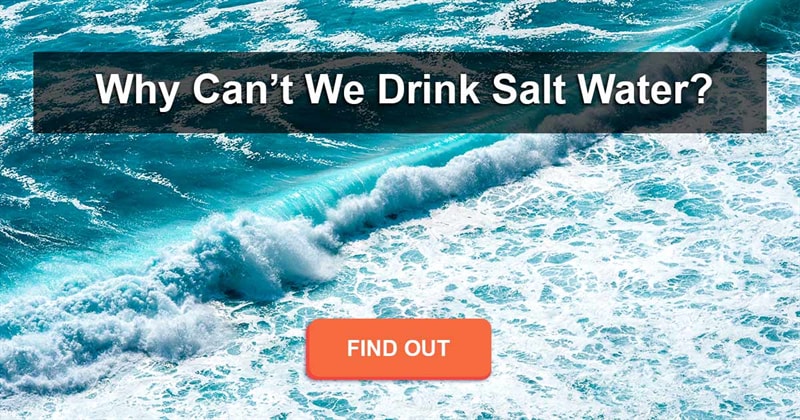If you're stuck in the middle of the ocean, why can't you drink the salt water?

Left to their own devices, salt and water diffuse until the salt concentration in the water is uniform. A familiar instance of this is that saltwater will dehydrate your skin, by a process called osmosis, because water flows out from your skin cells (where the salt concentration is lower) and into the saltwater (where the salt is more concentrated).
If your bloodstream has a higher concentration of salt than the cells that it's in contact with, those cells will similarly dehydrate. When it comes to the cells in your internal organs (and the cells in the blood itself), it's clear why this can kill you pretty quickly. To remain alive, vertebrates need to keep the salt content in their blood to about 0.9%.
It's possible to separate the salt from the water, but only by processes that consume energy. Such are the laws of thermodynamics! There are, in fact, industrial desalination plants that take the salt out of seawater, but this is often too expensive to be an economically viable source of water for human consumption or agricultural irrigation.
Your kidneys are little desalination plants that can remove salt from your bloodstream and expel it in your urine, but only up to a point. The human kidneys cannot produce urine that is more than about 2% salt. Since seawater is about 3.5% salt, if you drank it the concentration of salt in your bloodstream would increase, disrupting your metabolic processes and, if you kept it up for more than a little while, killing you.
Other mammals have more powerful kidneys, which can concentrate salt in the urine to more than 3.5% and can therefore survive drinking seawater. But this seems to be sufficiently costly that even sea-dwelling mammals like seals and manatees will avoid it if they can, preferring to get water from their food, either directly or by a metabolic reaction. See "How can sea mammals drink saltwater?"
Saltwater fish, of course, can expel salt efficiently enough to keep the concentration in their blood at the 0.9% level. Freshwater fish need to do the opposite, excreting very pure water in order to keep their blood saltier than the water in which they swim. A few fish, like salmon, can pull of the trick of surviving in both fresh and saltwater.

Diagram showing the flow of salt (ions) and pure water for a saltwater fish. Source: Wikipedia.
Some evolutionary biologists believe that the original vertebrates all lived in the sea, which back then might have been about 0.9% salt. As the sea's salt content started to increase, some vertebrates escaped to dry land or fresh water, carrying the imprint of their seafaring origins in their blood. The vertebrates that stayed in the sea would've had to develop powerful mechanisms of "osmoregulation"; see, e.g., "Vertebrate & Fish Evolution".
Do you think humans will ever be able to drink salt water? Will evolution lead us in this direction?
Interesting Facts
9 images of crazy moments shot by Internet users
8/12/2021
by
brian l
Here are nine crazy moments shot on camera by internet users :)
5 fascinating kangaroo facts
8/10/2021
by
brian l
Here are five cool facts about these amazing creatures!
Photos and videos that will definitely impress you
8/14/2021
by
brian l
These ten photos and videos we would be sharing are meant to impress you.
5 scary animals with an undeserved reputation
8/5/2021
by
brian l
We evolved to take animal threats seriously. But sometimes the animal in question is a show off. Many dangerous looking animals are harmless.
You never knew these 8 facts were actually true!
8/7/2021
by
Della Moon
Get ready for a set of big surprises, as you definitely never expected these 8 facts to be true...















